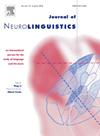Dynamic effect of context on processing L2 metaphors with varied conventionality: an ERP study
IF 1.2
3区 心理学
Q2 LINGUISTICS
引用次数: 0
Abstract
The role of context in inferring the meaning of metaphors has been the focus of attention, yet it remains less clear how context takes effect in the online processing of L2 conventional and novel metaphors. We conducted a reading task, in which Chinese-English bilinguals were presented with conventional and novel metaphorical English sentences preceded by supportive or literal contexts, and were required to select an adjective matched with target sentences. We recorded EEG activity while participants read metaphorical sentences divided into three segments based on their syntactic structure (X IS Y). Results showed that novel metaphors in supportive contexts evoked an increased sustained negativity (600–800 ms) in the frontal region in the first two segments, a larger frontal N400 (350–450 ms) in the second and third segments, and a reduced late frontal positivity (550–800 ms) in the third segment than in literal contexts. These results showed that for novel metaphors, supportive context inhibits the early-stage lexical access but facilitates the late-stage integration of metaphorical meanings. However, no similar difference was observed for conventional metaphors, as their salient meanings could be directly accessed. This finding suggests that context plays a dynamic role in the time course of L2 metaphor processing, particularly for novel ones. In brief, this study reveals that metaphor conventionality can modulate the effect of context on L2 metaphor processing, thus complementing the debate over the role of context in L2 metaphor comprehension.
语境对二语隐喻加工的动态影响:一个ERP研究
语境在隐喻意义推断中的作用一直是人们关注的焦点,但语境在二语传统隐喻和新隐喻在线加工中的作用尚不清楚。我们进行了一项阅读任务,向中英双语者提供传统的和新颖的英语隐喻句子,前面有支持或字面上下文,并要求他们选择一个与目标句子相匹配的形容词。我们记录了参与者在阅读根据句法结构(X和Y)分为三段的隐喻句子时的脑电图活动。结果表明,与文字语境相比,支持语境下的新隐喻在前两个脑区诱发了持续的负性反应(600 ~ 800 ms),在第二和第三脑区诱发了更大的N400 (350 ~ 450 ms),而在第三脑区诱发了较低的后期正面反应(550 ~ 800 ms)。结果表明,对于新隐喻,支持性语境抑制了早期词汇的获取,但促进了后期隐喻意义的整合。然而,对于传统的隐喻,没有发现类似的差异,因为它们的显著意义是可以直接获得的。这一发现表明语境在二语隐喻加工的时间过程中起着动态的作用,特别是对于新奇的隐喻。总之,本研究揭示了隐喻的惯例性可以调节语境对二语隐喻加工的影响,从而补充了关于语境在二语隐喻理解中的作用的争论。
本文章由计算机程序翻译,如有差异,请以英文原文为准。
求助全文
约1分钟内获得全文
求助全文
来源期刊

Journal of Neurolinguistics
医学-神经科学
CiteScore
3.90
自引率
5.00%
发文量
49
审稿时长
17.2 weeks
期刊介绍:
The Journal of Neurolinguistics is an international forum for the integration of the neurosciences and language sciences. JNL provides for rapid publication of novel, peer-reviewed research into the interaction between language, communication and brain processes. The focus is on rigorous studies of an empirical or theoretical nature and which make an original contribution to our knowledge about the involvement of the nervous system in communication and its breakdowns. Contributions from neurology, communication disorders, linguistics, neuropsychology and cognitive science in general are welcome. Published articles will typically address issues relating some aspect of language or speech function to its neurological substrates with clear theoretical import. Interdisciplinary work on any aspect of the biological foundations of language and its disorders resulting from brain damage is encouraged. Studies of normal subjects, with clear reference to brain functions, are appropriate. Group-studies on well defined samples and case studies with well documented lesion or nervous system dysfunction are acceptable. The journal is open to empirical reports and review articles. Special issues on aspects of the relation between language and the structure and function of the nervous system are also welcome.
 求助内容:
求助内容: 应助结果提醒方式:
应助结果提醒方式:


